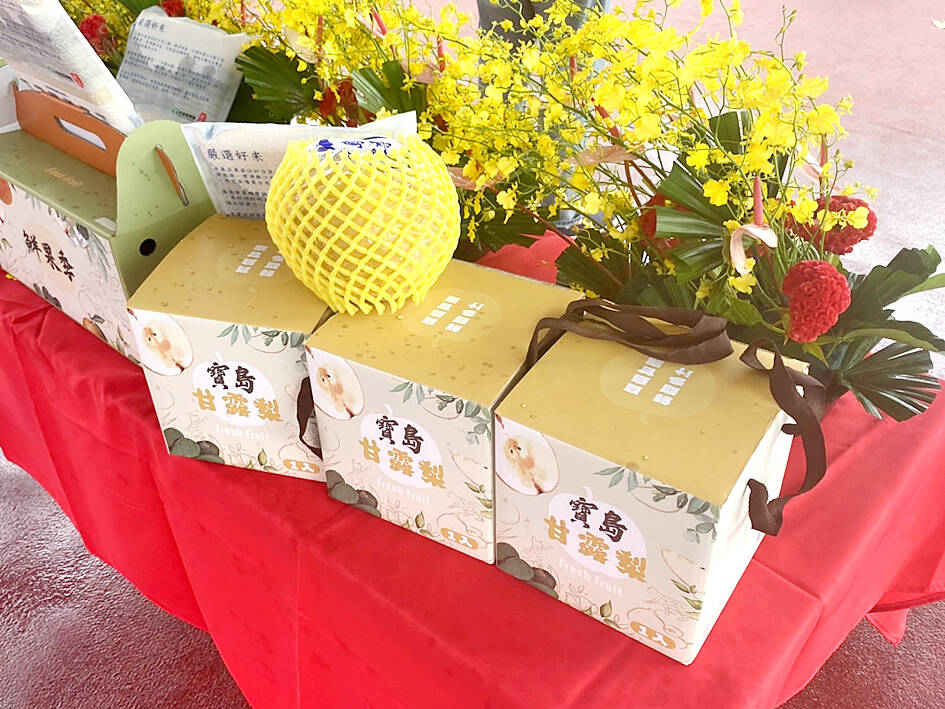The Ministry of Agriculture has authorized a shipment of pears that were bred in Taiwan to the UK for the first time, adding to a string of successes in exporting agricultural products to new global markets.
The ministry said it chose to ship the “Baodao Ganlu Jumbo Pear” (寶島甘露梨), which is crunchy and juicy, and has a flavor akin to sugarcane, because it is sufficiently hardy to last the one-month storage period aboard ships bound for Europe.
Ministry officials said that in recent weeks they had also sold pomeloes to the UK, followed by the shipment of 3.53 tonnes of jumbo pears, and they expect more progress in opening up new markets overseas for the nation’s fruits and other agricultural products.

Photo: Chang Hsuan-tse, Taipei Times
The pear is considered a “Taiwanese native cultivar,” developed by Liu Shen-chuan (劉申權), a fruit grower in his 70s with a farm in the mountains of Miaoli County’s Jhuolan Township (卓蘭).
The jumbo pear usually grows bigger than an average person’s face.
Following years of grafting, undergoing trials and diligent work, Liu filed for a patent for the new pear, which he and other authorized farmers can grow without having to import pear blossom budwood from Japan or China for grafting.
The pear has shown resistance to various diseases and infections, thereby reducing the amount of pesticide required, ministry officials said.
Trials have shown that the pear can be stored at 5°C or below for up to three months, said Su Teng-chao (蘇登照), head of the Fruit and Flower Industry Division at the Agriculture and Food Agency.
Su said the pears are in demand in Taiwan, which has driven up prices, and more farmers are switching to the variety.
The pear can weigh as much as 2kg and a gift pack of two can sell for more than NT$1,000, Agriculture and Food Agency deputy head Yao Chih-wan (姚志旺) said.
There are 4,946 hectares dedicated to growing the pear, mainly in hills and mountains of Jhuolan Township and Taichung’s Dongshih District (東勢), and annual production has reached about 100,000 tonnes, Yao said.
“We believe more people will switch to buying this pear, because it has a good, sweet taste and crunchy texture, and also a nice appearance. Many consumers have said that its taste and quality have surpassed that of imported Asian pears, so we expect the demand to grow,” he said.
Previously Taiwanese Asian pears were exported mainly to Singapore, Hong Kong and Malaysia due to the short shipping time, but this is the first time a Taiwanese exporter has clinched a deal to deliver to the UK, Yao said.
Taiwan’s fruit exports previously had mainly targeted China, but after repeated bans by the Chinese government, exporters are turning to Japan, South Korea, Canada, the UK and other overseas markets where they sell at higher prices, he said.
He also quoted a fruit exporter who declined to be named, who said that since China banned Taiwanese pineapples, the prevalent view is that the Chinese market is too risky and so Taiwanese firms are exploring other overseas markets.
“We must do it, because we cannot put all our eggs in one basket,” the exporter said.
Additional reporting by Jason Pan

The US government has signed defense cooperation agreements with Japan and the Philippines to boost the deterrence capabilities of countries in the first island chain, a report by the National Security Bureau (NSB) showed. The main countries on the first island chain include the two nations and Taiwan. The bureau is to present the report at a meeting of the legislature’s Foreign Affairs and National Defense Committee tomorrow. The US military has deployed Typhon missile systems to Japan’s Yamaguchi Prefecture and Zambales province in the Philippines during their joint military exercises. It has also installed NMESIS anti-ship systems in Japan’s Okinawa

‘WIN-WIN’: The Philippines, and central and eastern European countries are important potential drone cooperation partners, Minister of Foreign Affairs Lin Chia-lung said Minister of Foreign Affairs Lin Chia-lung (林佳龍) in an interview published yesterday confirmed that there are joint ventures between Taiwan and Poland in the drone industry. Lin made the remark in an exclusive interview with the Chinese-language Liberty Times (the Taipei Times’ sister paper). The government-backed Taiwan Excellence Drone International Business Opportunities Alliance and the Polish Chamber of Unmanned Systems on Wednesday last week signed a memorandum of understanding in Poland to develop a “non-China” supply chain for drones and work together on key technologies. Asked if Taiwan prioritized Poland among central and eastern European countries in drone collaboration, Lin

Renewed border fighting between Thailand and Cambodia showed no signs of abating yesterday, leaving hundreds of thousands of displaced people in both countries living in strained conditions as more flooded into temporary shelters. Reporters on the Thai side of the border heard sounds of outgoing, indirect fire yesterday. About 400,000 people have been evacuated from affected areas in Thailand and about 700 schools closed while fighting was ongoing in four border provinces, said Thai Rear Admiral Surasant Kongsiri, a spokesman for the military. Cambodia evacuated more than 127,000 villagers and closed hundreds of schools, the Thai Ministry of Defense said. Thailand’s military announced that

CABINET APPROVAL: People seeking assisted reproduction must be assessed to determine whether they would be adequate parents, the planned changes say Proposed amendments to the Assisted Reproduction Act (人工生殖法) advanced yesterday by the Executive Yuan would grant married lesbian couples and single women access to legal assisted reproductive services. The proposed revisions are “based on the fundamental principle of respecting women’s reproductive autonomy,” Cabinet spokesperson Michelle Lee (李慧芝) quoted Vice Premier Cheng Li-chiun (鄭麗君), who presided over a Cabinet meeting earlier yesterday, as saying at the briefing. The draft amendment would be submitted to the legislature for review. The Ministry of Health and Welfare, which proposed the amendments, said that experts on children’s rights, gender equality, law and medicine attended cross-disciplinary meetings, adding that